OCOP products must definitely follow the direction of brand and quality.
(Baonghean.vn) - This was emphasized by Director of Nghe An Department of Agriculture and Rural Development Phung Thanh Vinh when answering questions at the 14th session of the 18th Provincial People's Council on the issue of developing OCOP products.
On the afternoon of July 6, the 14th session of the 18th term People's Council of Nghe An province held a question and answer session on the current situation, causes and solutions for implementing policies to support agricultural development, restructuring crops and livestock associated with production and consumption of OCOP products in the context of adapting to the impact of climate change and market fluctuations. The question and answerers were the Directors of the Departments of Agriculture and Rural Development; Science and Technology; and Industry and Trade.
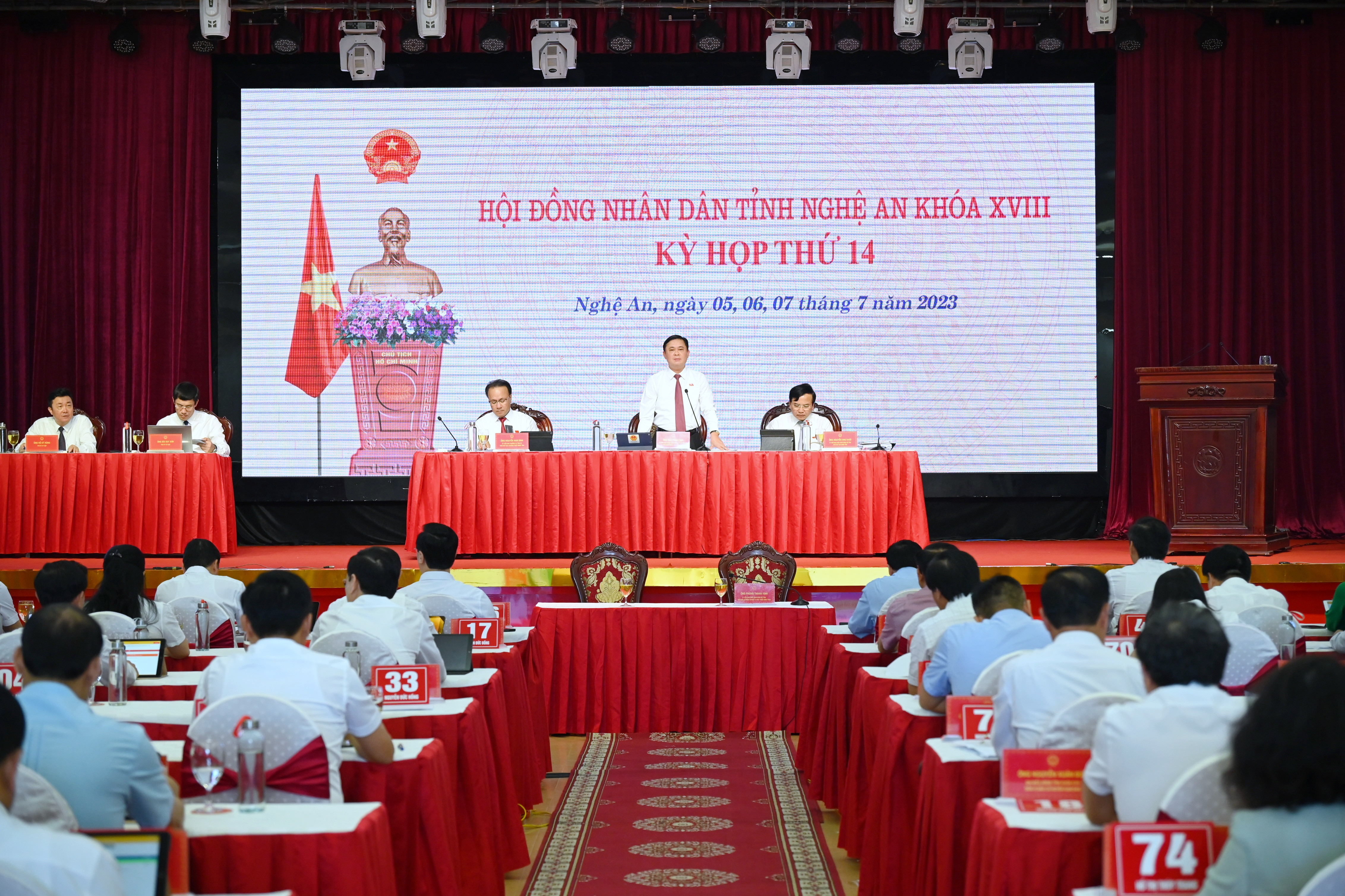
Comrades: Thai Thanh Quy - Member of the Party Central Committee, Secretary of the Provincial Party Committee, Chairman of the Provincial People's Council, Head of the Provincial National Assembly Delegation; Nguyen Nam Dinh - Member of the Provincial Party Standing Committee, Permanent Vice Chairman of the Provincial People's Council; Nguyen Nhu Khoi - Member of the Provincial Party Executive Committee, Vice Chairman of the Provincial People's Council chaired the meeting.
Attending the question and answer session were comrades: Nguyen Van Thong - Standing Deputy Secretary of the Provincial Party Committee; Nguyen Duc Trung - Deputy Secretary of the Provincial Party Committee, Chairman of the Provincial People's Committee; Hoang Nghia Hieu - Deputy Secretary of the Provincial Party Committee; Vo Thi Minh Sinh - Member of the Standing Committee of the Provincial Party Committee, Chairman of the Vietnam Fatherland Front Committee of Nghe An province; comrades of the Standing Committee of the Provincial Party Committee, the Provincial Party Executive Committee; delegates of the Provincial People's Council from 21 delegation groups and invited delegates.
LOCALITIES ARE STILL CONFUSED IN CHOOSING KEY OCOP PRODUCTS
At the question-and-answer session, 15 delegates of the Provincial People's Council raised 23 questions. The delegates basically followed the content of the question, asked concise and clear questions, ensuring time, in which, many delegates focused on questioning the content related to building, developing, and creating output for OCOP products.
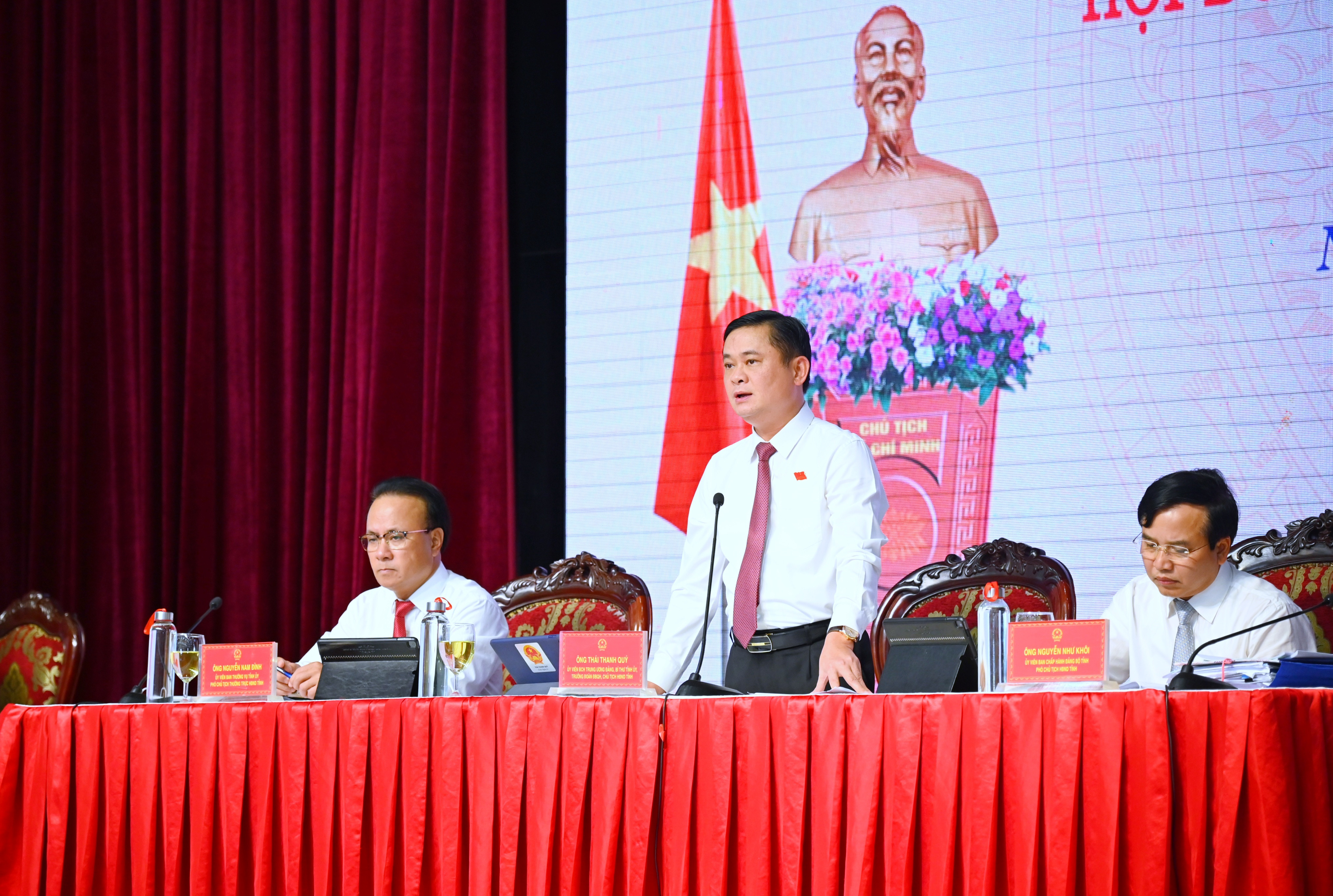
Nghe An currently has 403 products ranked as OCOP 3 stars or higher; of which, 1 product is ranked as 5 stars; 43 products are ranked as 4 stars and 359 products are ranked as 3 stars; of which, 11 products are exported abroad. Nghe An is the second province in the country in terms of the number of recognized star-rated products (after Hanoi).
The participants of the OCOP Program have contributed to creating regular jobs for about 2,300 workers and 1,800 - 2,000 seasonal workers, with an average income of 4 - 4.4 million VND/person/month, contributing to promoting rural economic development.
However, the development of OCOP products in Nghe An is currently posing many problems; in particular, although there are many OCOP products, according to the opinions of many delegates of the Provincial People's Council, the effectiveness has not been as expected.
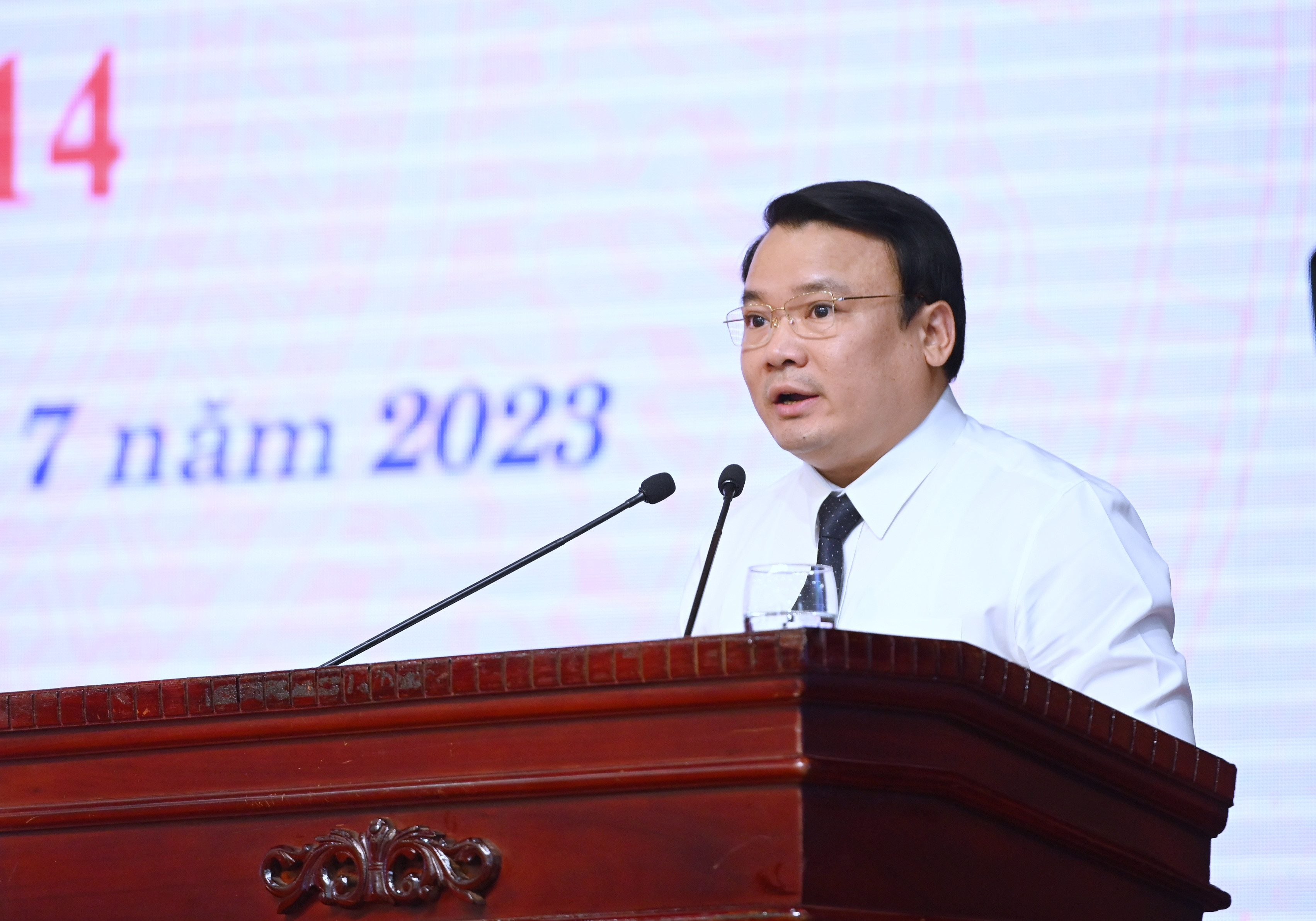
Delegate Pham Tuan Vinh - Delegate Group of Thai Hoa town: From the analysis data, it was determined that there are still many OCOP products without raw material planning and requested the leaders to provide solutions to overcome these problems.
On the other hand, the delegate from Thai Hoa town also said that the policy of encouraging agricultural development associated with eco-tourism and experience still has many shortcomings in terms of planning, land, and construction investment.
Responding to delegates, Director of Nghe An Department of Agriculture and Rural Development Phung Thanh Vinh commented: OCOP is the "One Commune One Product" Program, but in reality, there are communes with many products. These are products with unique characteristics, identity, culture of the region, climate and soil conditions of the region, so they can be called specialties.
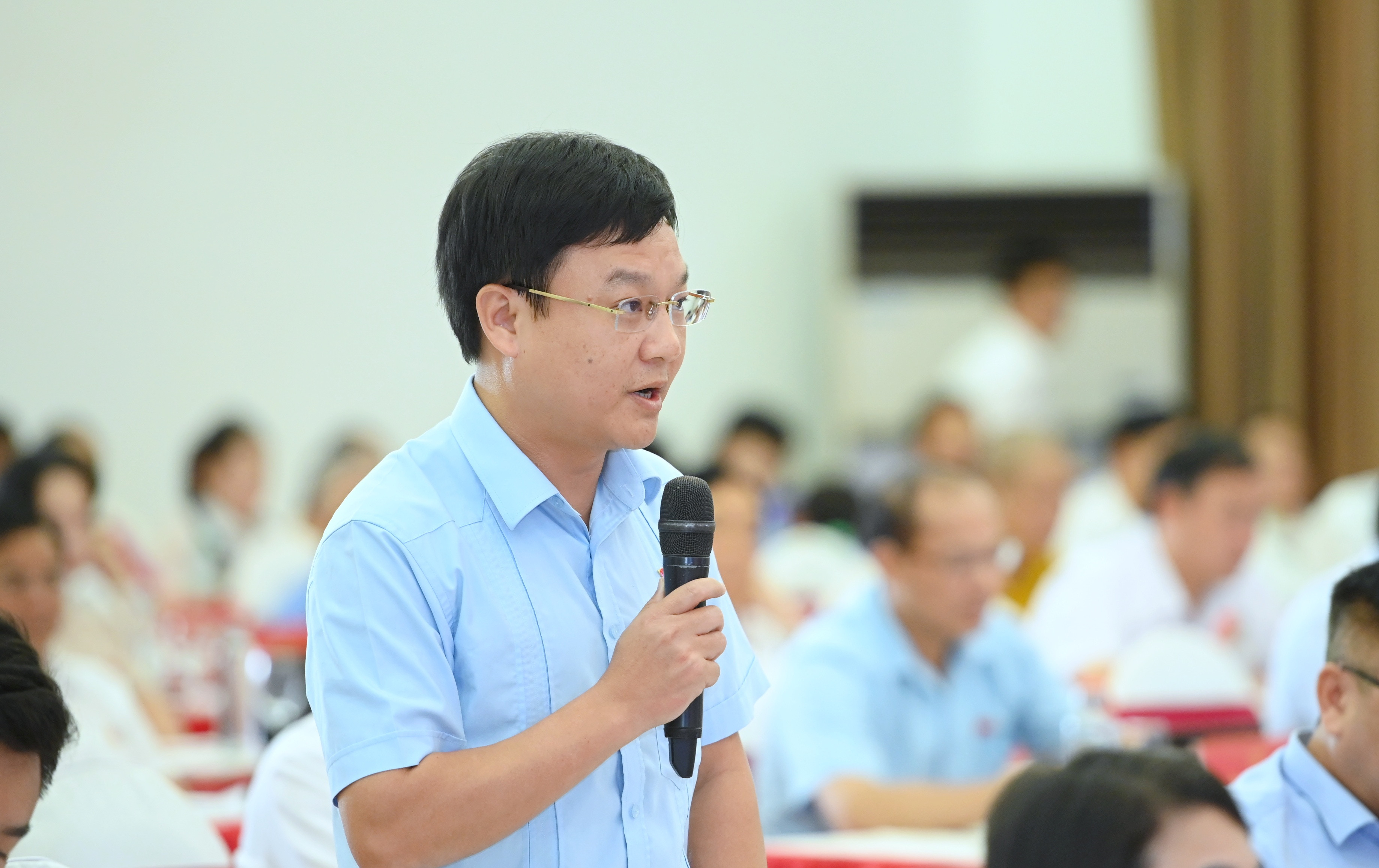
OCOP products are developed in the direction of shifting from agricultural production to agricultural economy, increasing value and stabilizing resources for the rural economy. However, according to the head of Nghe An Agriculture, the important thing now is that the development of OCOP products must be in the direction of ensuring sustainable and safe production, improving quality, and building brands. Therefore, if possible, it is necessary to re-plan by region, sub-region, climate and soil to develop the supply of raw materials.
On the other hand, according to the Director of the Department of Agriculture and Rural Development, the State's support factor in developing OCOP products only accounts for about 20-30%, except for training, coaching, and technology transfer policies that are 100% supported. Therefore, if OCOP products want to develop sustainably, they must find businesses to invest in them and the production and business households themselves must have the resources to implement them.
Regarding agricultural development associated with eco-tourism, experiences, and connection with the National Target Program on new rural construction and OCOP products, Mr. Phung Thanh Vinh said: The Provincial People's Committee has issued a plan to implement the rural tourism development program in new rural construction.
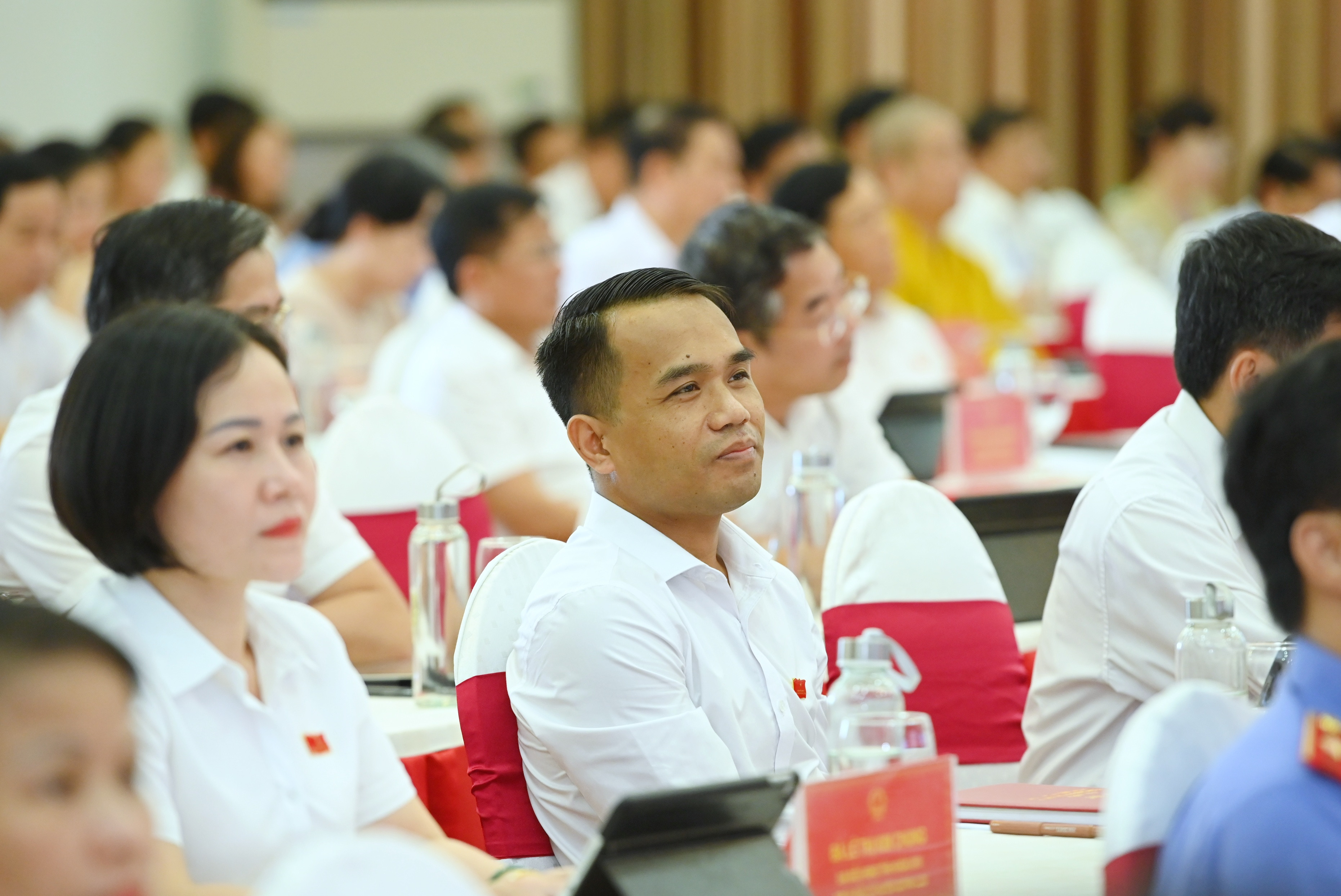
In particular, identify solutions and assign tasks to departments, branches, sectors and localities to deploy and implement specifically. First of all, on the basis of the Provincial Planning for the period 2021 - 2030, with a vision to 2050, organize a review of products that can participate in the type of agricultural tourism; from there, coordinate with the Department of Tourism to advise the Provincial People's Committee to plan in the direction of reasonable, scientific, green and sustainable rural tourism.
Mr. Vinh also said that in the coming time, Nghe An will continue to improve credit and land policies; develop eco-tourism, resort and entertainment activities in special-use and protective forests in accordance with the Forestry Law; organize reviews and specific statistics on the construction of pilot models of agricultural tourism, to evaluate the results, shortcomings and limitations of each model and then replicate them.
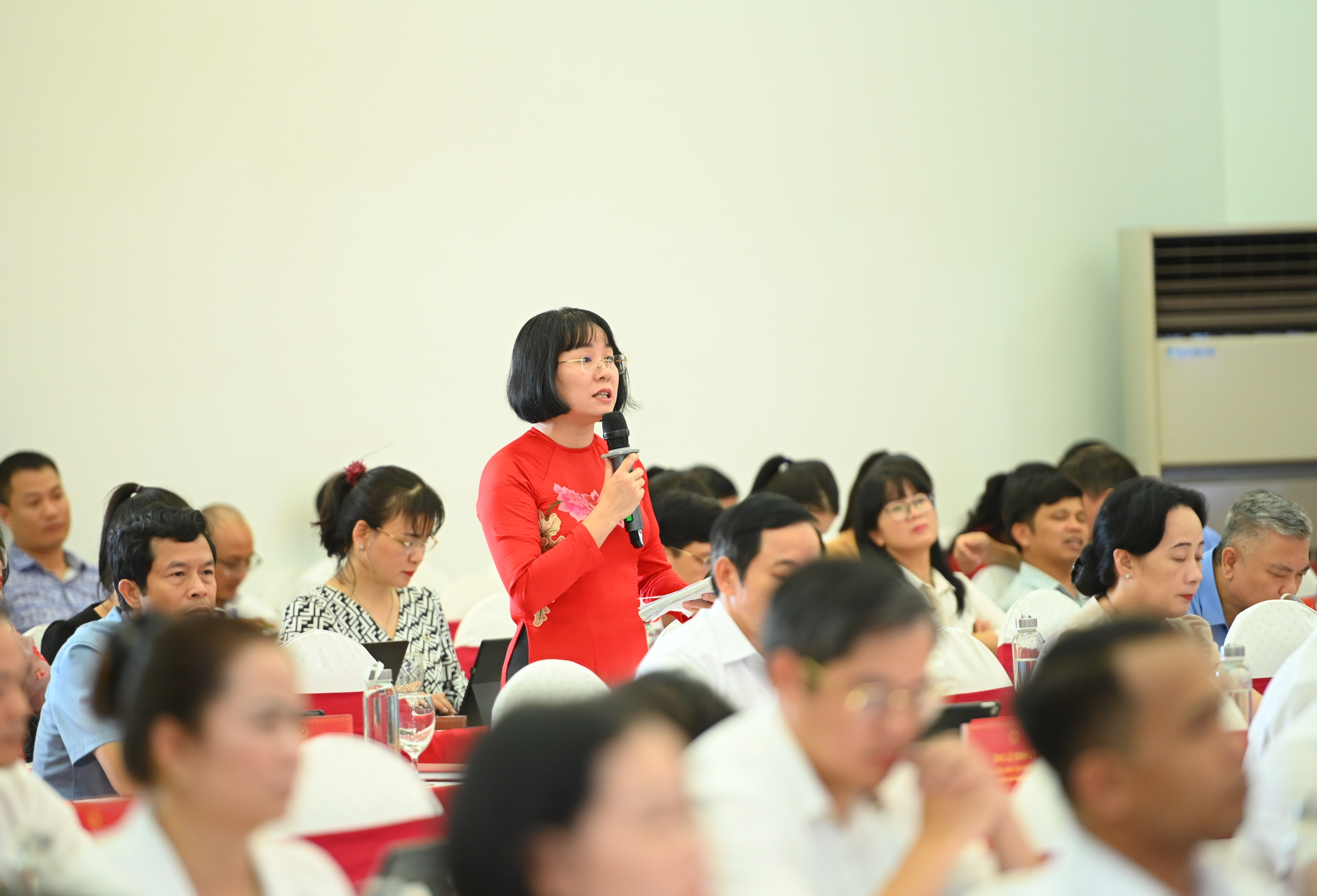
Also related to this content, delegate Que Thi Tram Ngoc - Quy Chau district delegation requested the leaders of the Agriculture sector to evaluate and comment that: The goal of the OCOP Program is to develop products with local advantages, however, currently, OCOP products are still spontaneous, so the output is not stable, the economic value is not high, and is not uniform among localities.
Responding to the delegates' opinions, the Director of the Department of Agriculture and Rural Development affirmed: The development and recognition of OCOP products is not spontaneous because it must follow a selection process from the grassroots level, meeting standards and conditions to be recognized, for example, according to regulations, OCOP products with 3 stars or more must participate in the market.
However, the problem of unstable output comes from the limitation that localities are still confused in choosing key OCOP products of districts and communes to develop, improve brand, quality, and connect with the market.
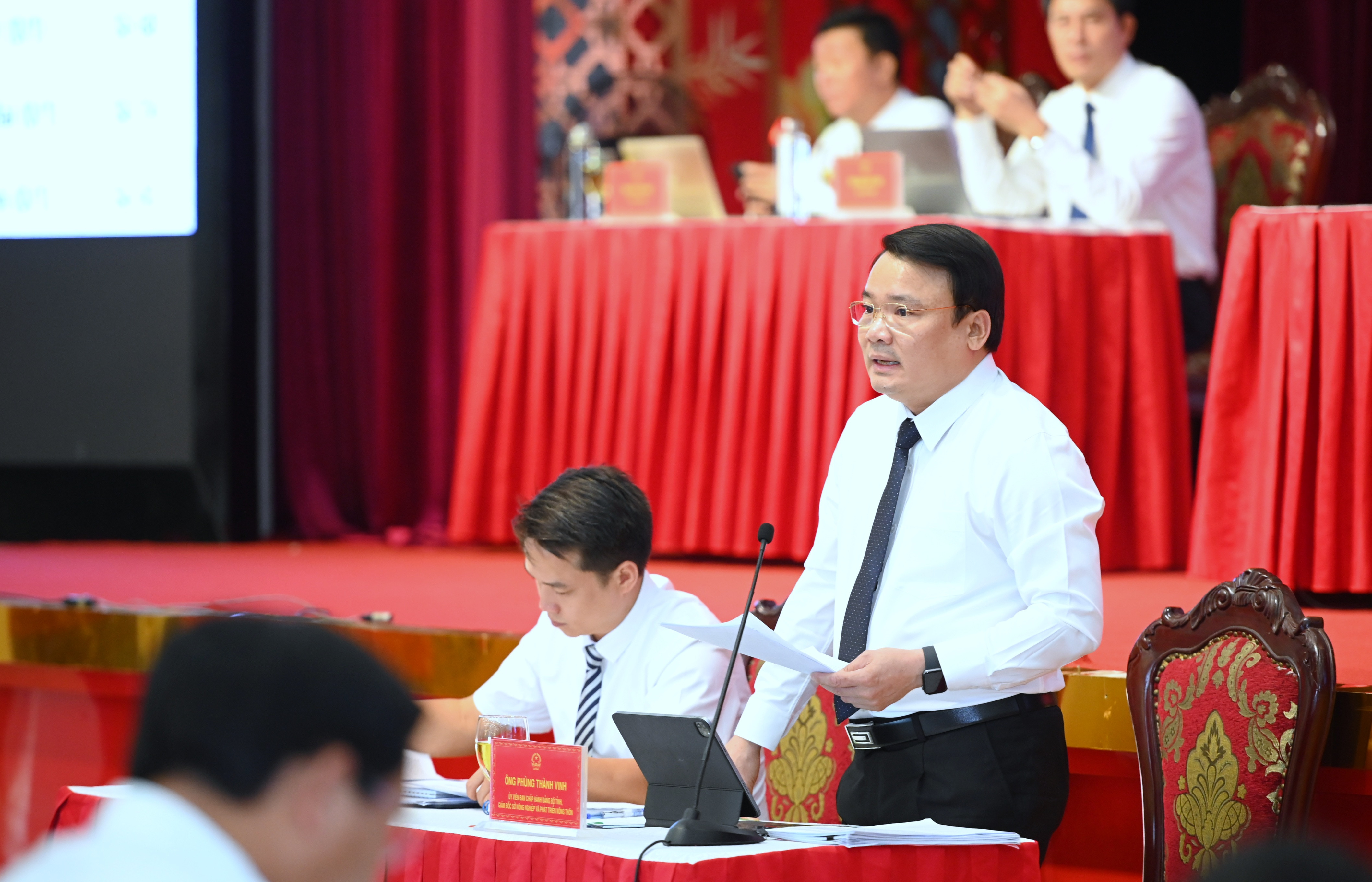
Recognizing the above limitations, emphasizing the motto "to go fast, go alone; but if you want to go far, you have to go together", the Director of the Department of Agriculture and Rural Development of Nghe An province pointed out that in the near future, OCOP products must definitely follow the direction of brand, quality and must join together to develop products. Even the subject of OCOP products must take care of their products and need to manage quality. "There is no such thing as fast, many, good and cheap", Mr. Vinh said.
Also at the question and answer session, delegates raised many other issues such as: Solutions for agricultural development in the context of climate change, registering for agricultural product trademark protection, improving the operational efficiency of cooperatives, developing forestry economy;... These issues were answered and clarified by the Director of the Department of Agriculture and Rural Development.
TOWARDS HIGH-QUALITY, SUSTAINABLE COMMODITY AGRICULTURAL PRODUCTION
On behalf of the chair, concluding the questioning on this content, Secretary of the Provincial Party Committee, Chairman of the People's Council of Nghe An province Thai Thanh Quy assessed: Although the Director of the Department of Agriculture and Rural Development has not been in office for long, he has a firm grasp of the issue, answered fully and quite clearly; proposed a number of immediate and long-term solutions to overcome limitations and shortcomings and properly perform the functions and tasks of the industry.
During the questioning, the Director of the Department of Industry and Trade and the Deputy Director in charge of the Department of Science and Technology answered questions related to their assigned fields; clarified issues of concern to the Provincial People's Council delegates and voters.
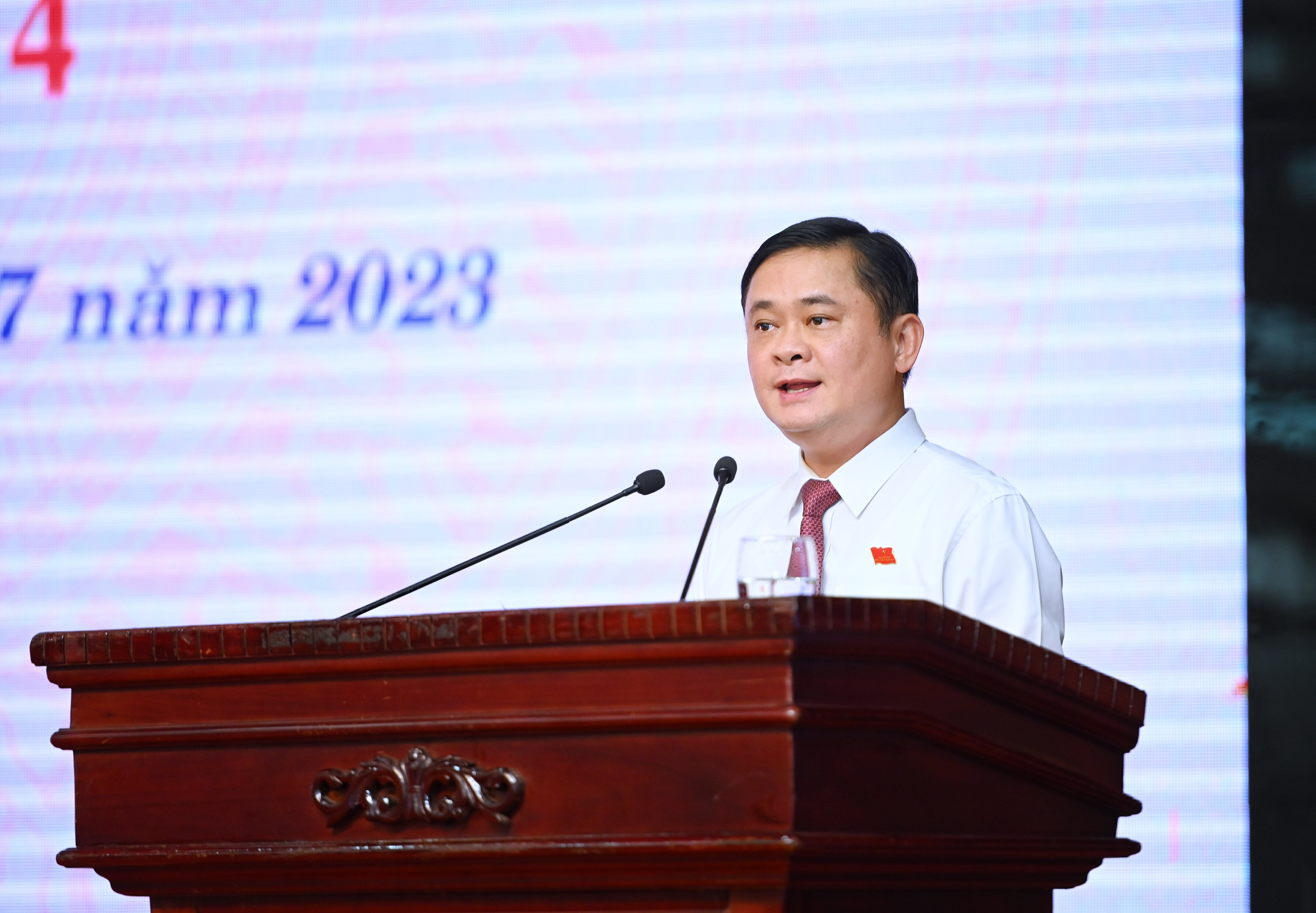
Through the content of the question and answer session, regarding the issue of agricultural and rural development, the Chairman of the Provincial People's Council emphasized: Nghe An is a province with strengths in agriculture, agriculture is the mainstay of the economy; however, the agricultural sector has been and is being deeply affected by climate change.
Secretary of the Provincial Party Committee, Chairman of the People's Council of Nghe An province Thai Thanh Quy commented: Many policies have been issued by the province to support agricultural development and have had correct and effective policies put into practice, promoting the effectiveness of agricultural and rural infrastructure; transferring and innovating production methods; transforming the structure of crops and livestock, applying scientific, technical and technological advances. In particular, the movement to build OCOP products has spread throughout the province. The appearance of the countryside is increasingly improving; the lives of people in rural areas are changing.
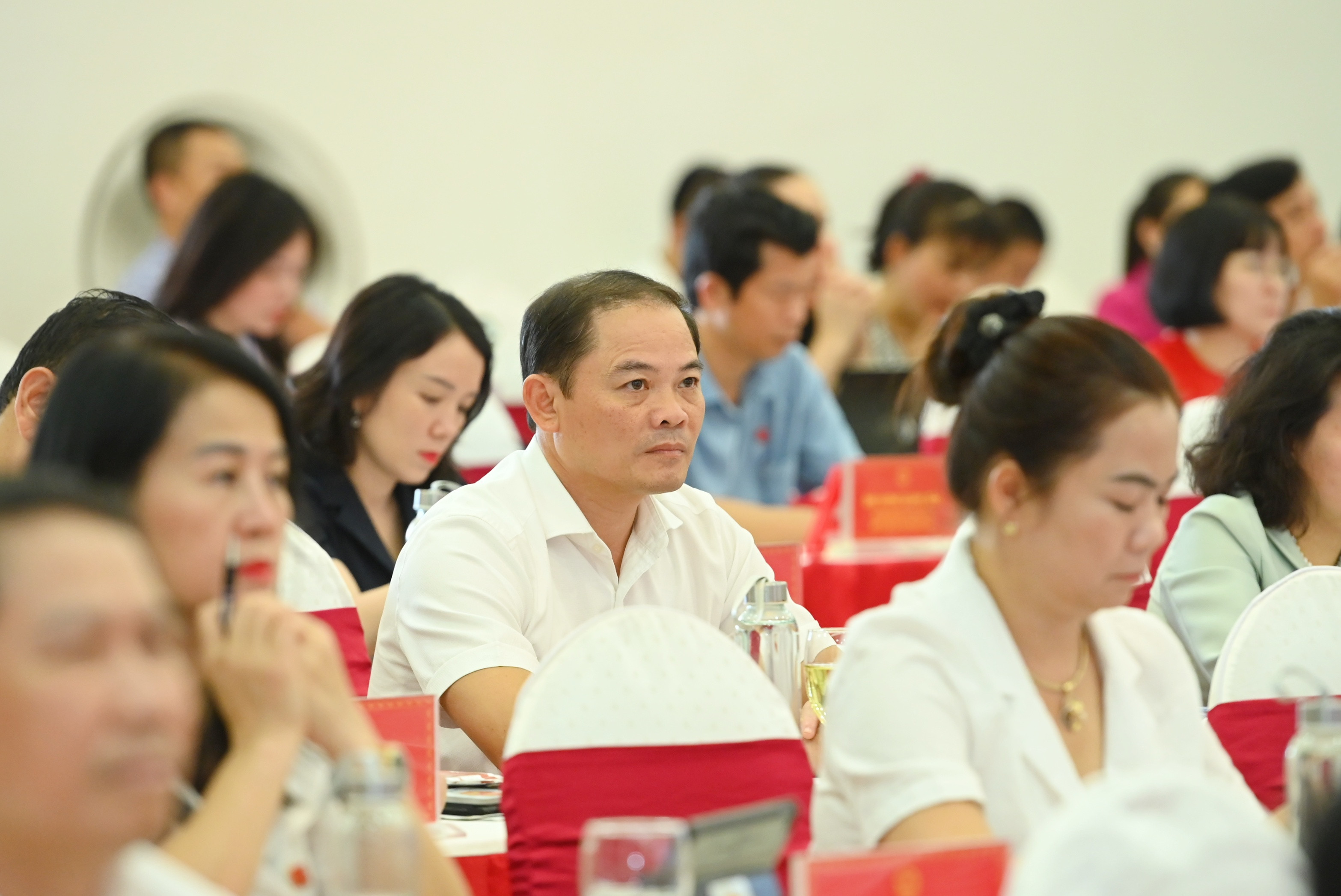
However, according to the Provincial Party Secretary and Chairman of the Provincial People's Council, there are still limitations, which are the slow dissemination of policies to people in remote areas and low efficiency. Some mechanisms and policies are not strong enough, fragmented, have inappropriate points, are inadequate, and not close to reality; policies are issued but the allocated budget is not enough, or even allocated slowly, so it has not encouraged investment in agricultural development, production scale conversion, land consolidation, plot exchange, and land accumulation.
The scale of crop and livestock restructuring is generally small and unstable, and has not created many commodity production areas or concentrated production areas to apply high technology and bring mechanization into production.
The Chairman of the Provincial People's Council also said that the application and transfer of science, technology and engineering has only taken place in a number of localities, projects and areas; has not been implemented synchronously; many good models and good practices have not been replicated; production linkages are still loose. The issue of building product brands is still limited; knowledge and skills on cooperation, product development, markets, trade and product promotion are still limited;...
From the above situation, Secretary of the Provincial Party Committee, Chairman of the People's Council of Nghe An province Thai Thanh Quy requested the Provincial People's Committee, sectors and localities to continue to effectively carry out propaganda, dissemination and implementation of existing policies; change awareness and production thinking, towards high-quality, sustainable commodity agricultural production; and link production to achieve high efficiency.
Conduct a review of the mechanisms and policies of the Central and the province, thereby adjusting and supplementing the inadequate contents if they are under the province's authority and recommending the Central Government the contents under the Central Government's authority; review the implementation of policies to overcome cumbersome and inaccessible procedures; at the same time, through the review, advise on policies strong enough to develop agriculture.
The head of the Provincial Party Committee and Provincial People's Council also requested to continue directing the accumulation of land, developing concentrated areas suitable for organic, ecological, sustainable crops and livestock, applying high technology and advanced techniques. To do so, it is necessary to promote socialization, mobilize resources, and attract businesses to invest in research, application, and transfer of science and technology.
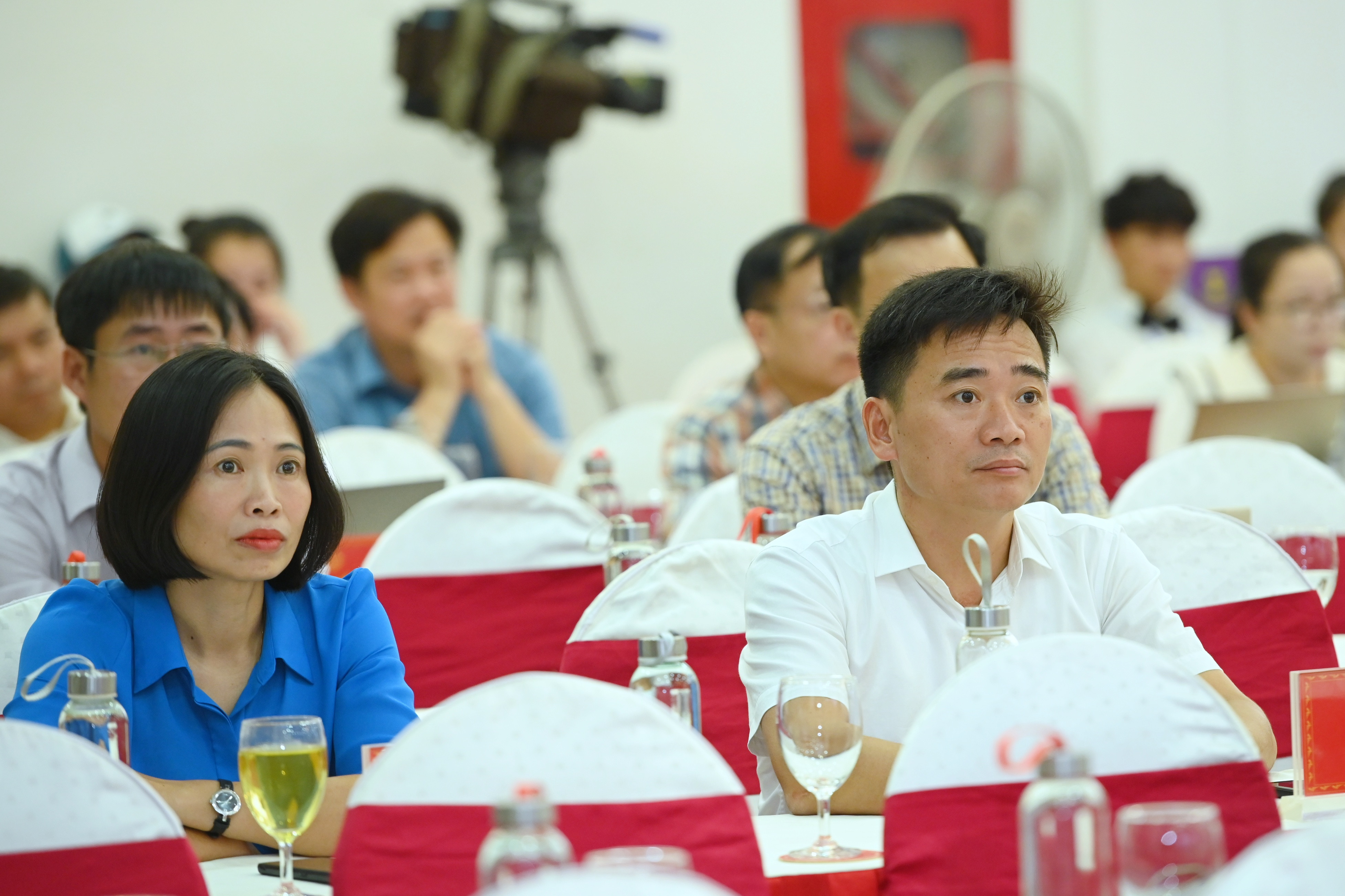
At the same time, invest in synchronous construction of infrastructure for specialized areas and technical services to ensure efficient production, support mechanization and production; form core clusters in each intensive area; encourage linkage mechanisms in agricultural production: horizontal linkage between actors (household economy, farms, cooperatives, agricultural enterprises, etc.), vertical linkage from production input to market output.
The Chairman of the Provincial People's Council also requested to strengthen the work of forecasting, evaluating, and warning information about the market of key agricultural products to adjust production plans accordingly; to build and complete the database on agriculture and rural areas to ensure good implementation in management, connecting information and data from production to connecting market supply and demand, tracing origin, controlling food safety, especially applying information technology, social sciences and humanities in developing OCOP products associated with rural tourism, preserving indigenous cultural values.
The Provincial Party Secretary and Chairman of the Provincial People's Council requested the Provincial People's Committee to direct relevant departments, branches and localities to implement the above-mentioned solutions. The Provincial People's Council Standing Committee, the Provincial People's Council committees, the Provincial People's Council delegations and the Provincial People's Council delegates shall monitor and supervise the conclusion of the questioning session, commit to receiving, explaining and implementing the commitments at the questioning session.
